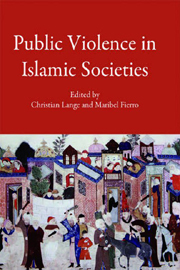 Public Violence in Islamic Societies
Public Violence in Islamic Societies Book contents
- Frontmatter
- Contents
- List of abbreviations
- Acknowledgements
- Introduction: Spatial, ritual and representational aspects of public violence in Islamic societies (7th–19th centuries ce)
- PART I Public violence and the construction of the public sphere
- PART II Ritual dimensions of violence
- PART III Representations of public violence
- 9 Responses to crucifixion in the Islamic world (1st–7th/7th–13th centuries)
- 10 Violence and the prince: the case of the Aghlabid Amīr Ibrāhīm II (261–89/875–902)
- 11 Concepts of justice and the catalogue of punishments under the Sultans of Delhi (7th–8th/13th–14th centuries)
- 12 Public violence, state legitimacy: the Iqāmat al-ḥudūd and the sacred state
- 13 Violence in Islamic societies through the eyes of non-Muslim travellers: Morocco in the 19th and early 20th centuries
- Index
12 - Public violence, state legitimacy: the Iqāmat al-ḥudūd and the sacred state
from PART III - Representations of public violence
Published online by Cambridge University Press: 12 September 2012
- Frontmatter
- Contents
- List of abbreviations
- Acknowledgements
- Introduction: Spatial, ritual and representational aspects of public violence in Islamic societies (7th–19th centuries ce)
- PART I Public violence and the construction of the public sphere
- PART II Ritual dimensions of violence
- PART III Representations of public violence
- 9 Responses to crucifixion in the Islamic world (1st–7th/7th–13th centuries)
- 10 Violence and the prince: the case of the Aghlabid Amīr Ibrāhīm II (261–89/875–902)
- 11 Concepts of justice and the catalogue of punishments under the Sultans of Delhi (7th–8th/13th–14th centuries)
- 12 Public violence, state legitimacy: the Iqāmat al-ḥudūd and the sacred state
- 13 Violence in Islamic societies through the eyes of non-Muslim travellers: Morocco in the 19th and early 20th centuries
- Index
Summary
Iqāmat al-ḥudūd – the implementation of the punishments specified in revelation – is subject to numerous caveats within Islamic legal theory. Caveats include the (at times) unrealistic demands of testimonial evidence for the ḥudūd, the suspension of punishment when the presence of the slightest doubt (shubha) is detected and the highly restrictive definitions of the crime. All these indicate the Muslim jurists' general attitude of extreme caution towards the implementation of ḥudūd punishments (iqāmat al-ḥudūd). Also among the caveats is the presence of a legitimate political authority to carry out the punishments, and this constitutes one general point of difference between the Sunnī and Imāmī Shīcī traditions of fiqh. There may not be a unanimous Sunni view on the legitimacy of particular governments in the post-Muḥammadan era, but the focus of much classical Sunnī juristic discussion on iqāmat al-ḥudūd is on the validity of judicial procedure, rather than the more fundamental issue of the legal powers of the judge, or more broadly, the state (if the use of such a term is not anachronistic). To be sure, classical Imāmī legal textbooks also have extended discussions of the procedure of iqāmat al-ḥudūd, and in this they are not radically dissimilar to their Sunnī counterparts. However, Imāmī jurists also incorporated explorations of state legitimacy through their discussions of iqāmat al-ḥudūd. This gave the topic the flavour of political theory. Since community rule by anyone other than the Imam was inherently problematic for Imāmī jurists, the right of any political structure to implement the ḥudūd was at least questionable.
- Type
- Chapter
- Information
- Public Violence in Islamic SocietiesPower, Discipline, and the Construction of the Public Sphere, 7th-19th Centuries CE, pp. 256 - 275Publisher: Edinburgh University PressPrint publication year: 2009


